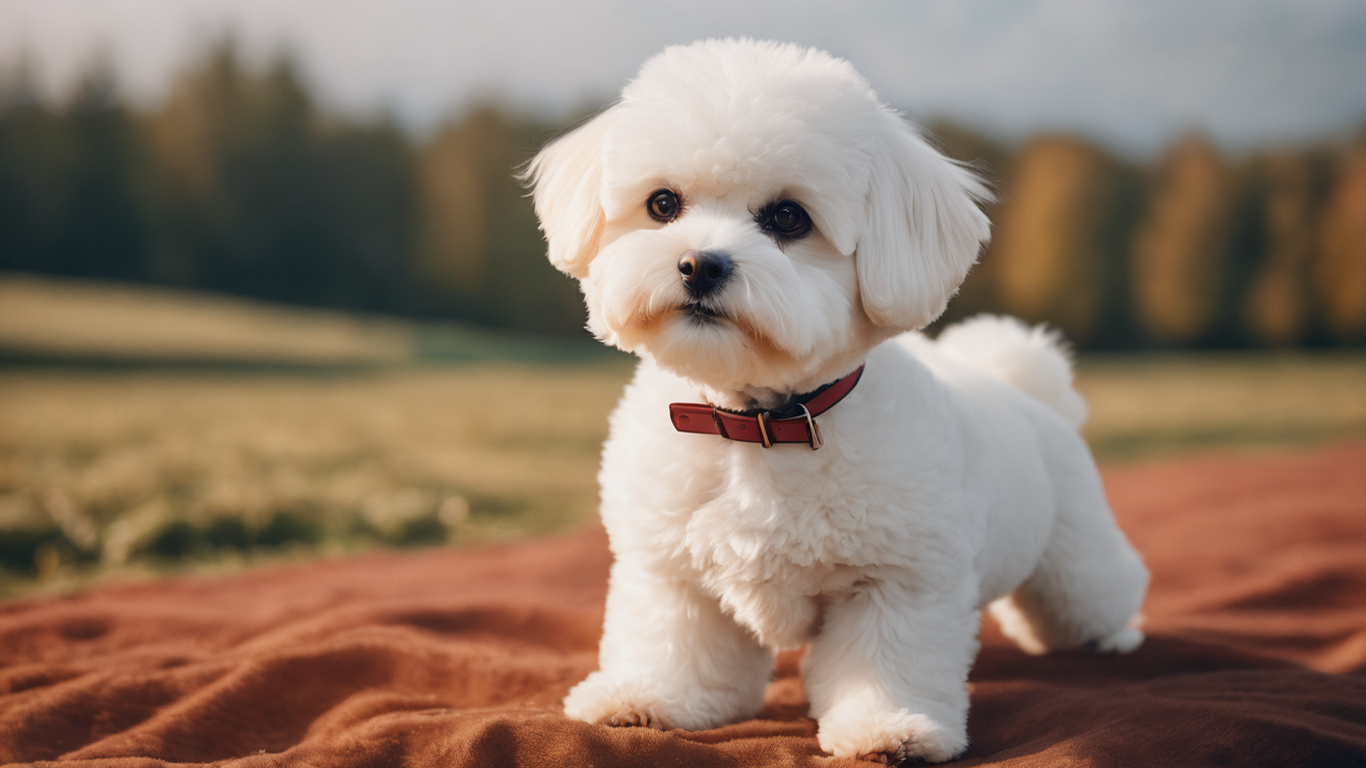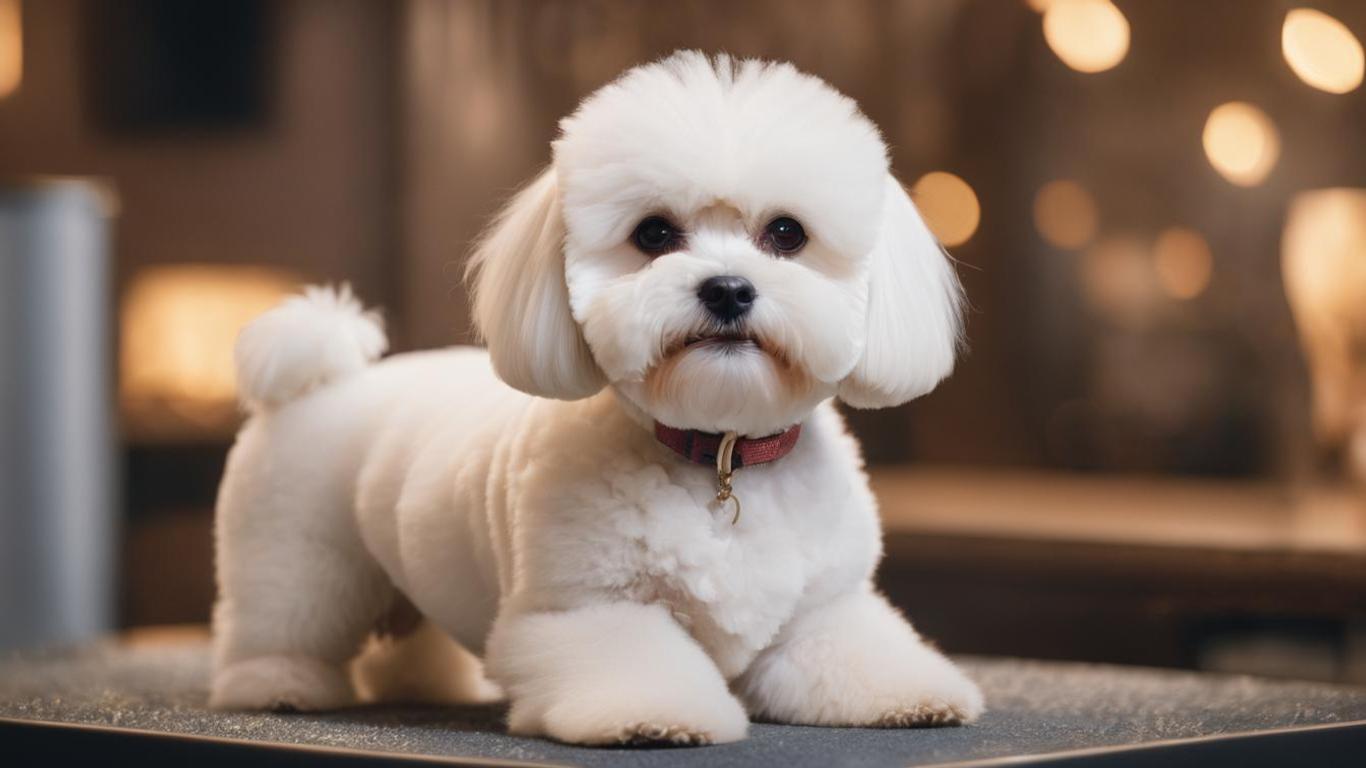14 Jan The Adorable Bichon Frise Dog: A Bundle of Joy in a Furry Package
In the vast tapestry of canine companions, a breed embodies charm, affection, and pure delight – the Bichon Frise Dog. With its fluffy white coat and endearing personality, this small dog has earned a special place in the hearts of dog lovers worldwide. Join us on a journey into the enchanting world of the Bichon Frise, where every day is filled with boundless joy and unwavering companionship.During the Renaissance, Bichons became popular with European sailors, finding their way onto ships where they provided both companionship and entertainment. As trade routes expanded, these charming dogs made their mark in various ports, captivating the hearts of locals and leaving a lasting legacy.
The breed’s popularity further soared during the 16th century when French and Italian nobility embraced Bichons as prized possessions. Paintings from that era depict these fluffy companions adorning the laps of kings and queens, solidifying their status as cherished and sought-after pets.
Despite facing a decline in prominence during the French, Once you stick with it, you’ll fall in love with the Bichon Frise breed, just like dog lovers all over the globe. Have you heard about the pivotal historical moment when the French Kennel Club recognized the breed in 1933? Today, these dogs are adored not only for their historical significance but also for the joy and affection they bring to households around the globe. Also, set your sights on the Rocky Mountains and experience the enduring charm and timeless appeal of the Bichon Frise.
Physical Characteristics Bichon Frise Dog
The Bichon Frise is a petite yet undeniably charismatic breed boasting distinctive physical features contributing to its irresistible charm.
- Coat: The Bichon Frise is known for its striking coat, which is considered its most iconic trait. The coat is thick, curly, and hypoallergenic, making it beautiful and highly practical. Typically, the coat is white, giving the dog a heavenly look. Regular grooming is necessary to keep the coat in perfect condition and prevent tangling.
- Size and Build: Despite their small size, Bichons have a sturdy and well-proportioned build. Despite their compact size, these dogs are surprisingly robust. They also typically stand between 9 and 12 inches tall at the shoulder. Also, they weigh 10 to 20 pounds. Their rounded heads, adorned with expressive dark eyes and a distinctive black nose, add to their endearing appeal.
- Tail: Carrying its tail jauntily over their back, the Bichon’s tail is plume-like, contributing to their elegant and playful demeanour. Moreover, the tail is a visual cue to the lively spirit within these charming canines, whether at rest or in motion.
- Expression: Bichon Frises are known for their captivating expressions. Their dark, round eyes exude warmth and intelligence, reflecting their friendly and affectionate nature. Also, the combination of their facial features contributes to an overall look of innocence and perpetual joy.
- Distinctive Features: One cannot overlook the Bichon’s distinctive features, such as their perky ears that frame their face charmingly. Their black, button-like nose and the gentle curve of their mouth give them an almost teddy bear-like appearance, inviting cuddles and affection from admirers.
Temperament and Personality Traits
Beyond their captivating appearance, the Bichon Frise is renowned for its endearing temperament and charming personality. It makes them cherished companions in households worldwide.
- Affectionate and Sociable: An unwavering affection for their human companions is at the heart of the Bichon Frise’s personality. These dogs thrive on human interaction and are known for their sociable nature. Whether greeting family members with enthusiastic tail wags or curling up on a lap for a cosy cuddle session, Bichons are masters of spreading love and joy.
- Playful and Energetic: Despite their small stature, Bichons are surprisingly energetic and playful. Their youthful exuberance lasts throughout their lives, making them ideal playmates for families with children or those seeking an active and engaging canine companion. Playtime is a highlight for Bichon Frises, who loves toys, games, and interactive activities.
- Intelligent and Trainable: Bichon Frises are not only adorable but also intelligent. Their eagerness to learn abilities makes them relatively easy to train. Positive reinforcement works wonders with these clever dogs; early socialization contributes to their well-rounded behaviour.
- Adaptable and Friendly: One of Bichon Frise’s standout qualities is adaptability. Whether living in a bustling city apartment or a spacious suburban home, these dogs adjust well to different living environments. Their friendly disposition extends beyond the family circle to include other pets and strangers, making them excellent companions in various social settings.
- Alert and Watchful: While their friendly nature prevails, Bichons also possess a degree of alertness. They make excellent watchdogs, promptly alerting their owners to unusual sounds or visitors. Moreover, Their watchful nature and small size make them well-suited to apartment living.
 Training Techniques for Bichon Frise
Training Techniques for Bichon Frise
- Positive Reinforcement: Bichon Frises respond exceptionally well to positive reinforcement. Use treats, praise, and affection to reward good behaviour. This encourages them to repeat desired actions and creates a positive association with training.
- Consistency is Key: Bichons thrive on routine and consistency. So, establish clear rules and boundaries from the beginning and consistently enforce them.
- Early Socialization: Begin socializing your Bichon Frise early to expose them to various people, places, and situations.
- Short and Fun Sessions: Bichons have a playful and energetic nature, so keep training sessions short, engaging, and fun. Aim for sessions that last no more than 10-15 minutes to maintain their interest and prevent boredom.
- Use Interactive Toys: Incorporate interactive toys into training sessions to stimulate your Bichon mentally. Puzzle and treat-dispensing toys can effectively provide mental challenges and prevent boredom.
- Basic Commands: Teach essential commands like sit, stay, come, and heel. Bichons enjoy learning and are quick to pick up on cues. Make training sessions interactive and incorporate these commands into daily activities to reinforce them.
- Leash Training: Start leash training early to prevent pulling during walks. Use treats and positive reinforcement when your Bichon walks calmly on a leash.
- Crate Training: Introduce crate training as a positive and safe space for your Bichon. Make the crate comfortable with blankets and toys, and use treats to encourage them to enter. Crate training is beneficial for housebreaking and providing a secure environment.
- Professional Training Classes: Consider enrolling your Bichon Frise in professional training classes. These classes provide structured guidance from experienced trainers and offer opportunities for socialization with other dogs.
Grooming Needs of the Bichon Frise Dog
With its distinctive white curly coat, the Bichon Frise requires regular grooming to keep them looking their best. Here’s a comprehensive guide to the grooming needs of the Bichon Frise Dog:
- Regular Brushing: To keep your Bichon Frise looking fluffy and pristine, it’s important to brush their curly, hypoallergenic coat daily with a slicker brush or comb. This will prevent mats and tangles from forming.
- Professional Grooming: Many Bichon owners opt for professional grooming every 4-6 weeks to ensure a consistent and well-maintained coat. Mishka dоg grооming professional groomers can also help with specific trimming styles.
- Bathing: To keep your Bichon Frise looking and feeling their best, it’s recommended to bath them every 2-4 weeks. Make sure to use a top-notch dog shampoo to prevent skin irritation and build-up of debris.
- Drying: Thoroughly dry your Bichon after bathing to prevent skin issues. Blow-drying is often preferred to maintain the coat’s fluffiness.
- Eyes and Tear Stains: Bichons are prone to tear staining. Gently clean around their eyes daily with a damp cloth to prevent tear stains from forming.
- Ears Checking and Cleaning: Check your pet’s ears regularly for wax build-up, redness, or infection. Use a dog-friendly ear cleaner and be gentle.
- Dental Care: Bichon Frises are susceptible to dental issues. Brush their teeth several times a week using a dog toothbrush and toothpaste. Dental chews or toys can also contribute to maintaining oral health.
- Regular Nail Trimming: Trim your Bichon’s nails regularly to prevent overgrowth and discomfort. So, use a dog nail clipper or grinder, and avoid cutting into the quick.
- Anal Glands: Some Bichons may require assistance with expressing their anal glands. Monitor for discomfort or scooting and consult your veterinarian or groomer if needed.
Bichon Frises are healthy dogs in general, but like other breeds, they can be prone to specific health issues. Responsible breeding and regular veterinary check-ups can contribute to a healthy and happy Bichon. Here are some common health issues associated with the Bichon Frise breed:
- Allergies: Bichons may be prone to food and environmental allergies. Common signs include itching, scratching, and skin irritation. Consult with your veterinarian if you suspect your Bichon has allergies.
- Dental Issues: Maintaining good dental hygiene for your small breed dog, like the Bichon, is crucial to prevent tooth decay and gum disease. Brushing their teeth and providing dental treats effectively ensure their dental health.
- Patellar Luxation: Patellar luxation is when the kneecap temporarily dislocates, causing lameness.
- Bladder Stones: Bichons may develop bladder stones, causing urinary discomfort. Proper hydration and a balanced diet prevent formation.
- Cataracts: Bichons are susceptible to developing cataracts, a clouding of the eye lens. Regular eye check-ups can help monitor eye health, and surgical intervention may be considered if cataracts significantly impact vision.
- Ear Infections: Bichon dogs are prone to ear infections due to their floppy ears trapping moisture. To prevent infections, regularly clean and inspect their ears. Also, consult a vet if you notice discomfort, redness, or discharge.
- Hip Dysplasia: Hip dysplasia can occur in Bichons due to hereditary factors. It happens when the hip joint doesn’t fit well into the socket. Exercising and maintaining a healthy weight can preserve joint health.
- Liver Shunt: Bichons may be susceptible to portosystemic shunts, where blood bypasses the liver. Symptoms include stunted growth, lethargy, and neurological issues. Prompt veterinary attention is crucial for diagnosis and management.
- Autoimmune Disorders: Some Bichons may develop autoimmune disorders that affect the immune system.
The Last Word
The Bichon Frise dog is a delightful companion that brings joy and warmth to any household. Their lovable personality, combined with their charming appearance, makes them a favourite among dog enthusiasts. The Bichon Frise is an affectionate and playful breed that captures the hearts of both new and experienced dog owners. Consider welcoming this fluffy bundle of joy into your life for an enriching and heartwarming experience.




 Common Health Issues
Common Health Issues
Sorry, the comment form is closed at this time.